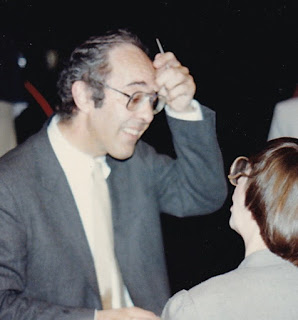An Unfinished Mystic

I have finally read Michael Ford’s most recent “portrait” of Henri J. M. Nouwen. I didn’t jump into it when I received it last summer partly because I needed a kind of sabbatical from Henri for a few of the same reasons I kept my distance in real life. Paulist Press, at the behest of Mike no doubt, sent it as thanks for including some of my thoughts on whether Henri was a mystic.
Lonely Mystic: A New Portrait of Henri J. M. Nouwen is the most intimate glimpse of Henri yet, if that’s even possible, given his intimate self-portrayals in almost every one of his own books. It may make those who want to see Henri canonized squirm a little, though not because of any illicit affairs or theological heresies or tasteless behavior. He was the consummate “best little boy in the world” that every gay boy and man wants to be, but his calling to a celibate vocation kept him lonely and needy and sometimes, broken.
I read with particular interest the chapter on Frank Hamilton’s close friendship with Henri. Begun as Frank eagerly sought out Henri for spiritual guidance, over many years it transformed to a friendship that I would describe as “soul friends.” I had heard some of the stories recounted in the chapter from Frank himself over a private dinner when he attended my first Columbia Seminary spiritual formation course on Henri. A few other stories are found in Henri’s own books. Btw, I’ve been asked to teach the course again September 17-20, 2020, and I’m thinking I will use this new book as one of the texts, prompting intriguing changes in the content.
Though I resisted the tug of Henri’s emotional needs as well as the spotlight of having a famous friend, I envied Frank a little for the spiritual intimacy he and Henri shared. Yet I had my own life to live as a gay activist and, I hoped, a spiritual guide within the LGBT community, and my notoriety as such even prompted Henri to decline a desire to dedicate one of my books to him, at least, while he was alive. After his death, I dedicated Coming Out as Sacrament to him, an ironic twist in that Henri never came out, though Mike points out that many a gay reader recognized their own experience through his books in his passionate reaching out to others and to God.
Mike asked me to reflect on the question, was Henri Nouwen a mystic? Using Evelyn Underhill’s stages of a mystic, I saw that Henri had experienced all five, though as “dimensions” of mysticism, cyclical rather than sequential. The final stage, union, is debatable. In that context, I suggested Henri might be considered an “unfinished mystic,” never having finally “arrived.” Like the chapters about various events in Lillian Helman’s memoir Unfinished Woman or Rembrandt’s many self-portraits over the years, each of Henri’s books may represent a self-portrait of Henri at that point in time, amid different circumstances, contexts, and communities.
I’ve written before that, in the spiritual life, there is no finish line. And that the greatest spiritual danger is to believe one has “arrived.” There are no “finishing schools” for saints, which accounts for their often eccentric, countercultural, and prophetic ways. For Mike’s purpose, I used as examples Henri’s unfinished books on Adam, his charge at Daybreak (completed by Sue Mosteller, his literary executrix), and the Flying Rodleighs, trapeze artists, who came to represent complete union with God. They had taught him the vital (life-giving) importance of “trusting the catcher,” in life and in death. That he never completed this book is emblematic of Henri’s own inability to let go. Instead of trusting, he was always trying to “catch the catcher” (take hold of God).
[Lonely Mystic, 150]
As Henri explained in Our Greatest Gift: A Meditation on Dying and Caring, the flyer is considered by the audience the hero in the trapeze act, as he or she lets go of the bar and does double or triple flips midair before being caught by the catcher. But the real hero is the catcher, whose timing is precise enough to reach for the flyer at just the right time. If the flyer tries to catch the catcher, the latter’s wrists might be broken, so trust in the catcher is key. Henri compared this to trusting God, the Divine Catcher, in life and in death. [Our Greatest Gift, 66-67]
Romantic Age poets saw worth and beauty in an unfinished work. Henri was a great romantic, and an “unfinished” mystic. That is what draws us to his writing—his vulnerability, his incompleteness, his wounds. Like the Jesus he followed, he was in every way like we are.
Visit Chris Glaser’s website here.
